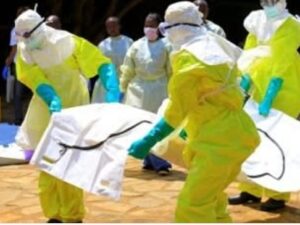JUST IN: Nigerian Govt Speaks On Ebola Virus Disease

Following the fresh outbreak of the deadly Ebola virus in Uganda, the Nigeria Centre for Disease Control and Prevention (NCDC), in collaboration with relevant ministries, departments, agencies, and partners through the National Emerging Viral Hemorrhagic Diseases (EVHD) Technical Working Group, has continued to monitor disease occurrences and has initiated measures to strengthen preparedness in the country.
According to a circular issued by the Director General of the NCDC, Dr. Jide Idris, strategies already implemented include updating the EVD emergency contingency plan, heightened surveillance, especially at points of entry, and optimizing diagnostic capacity for EVD testing in designated laboratories in cities with international airports and at the National Reference Laboratory.
“In addition, all Lassa fever testing laboratories can be activated to scale up testing if the need arises,” the statement added.
Ebola virus disease (EVD), formerly known as Ebola hemorrhagic fever, is a severe and often fatal illness caused by the Ebola virus, with a fatality rate of 25–90%.
There are five distinct species of the virus: Bundibugyo, Zaire (the most fatal strain, responsible for most EVD outbreaks, including the 2014–2016 outbreak in West Africa), Reston, Tai Forest, and Sudan (responsible for the outbreak in Uganda).
The infection is transmitted from animals to humans, with human-to-human transmission occurring through direct contact with body fluids (blood, saliva, vomit, urine, feces, sweat, breast milk, and semen) of an infected person, contaminated objects, or infected animals such as fruit bats, chimpanzees, gorillas, monkeys, porcupines, and forest antelope.
The virus can also be transmitted through contact with wildlife and unsafe burial practices.
The incubation period—i.e., the time from exposure to the development of symptoms—ranges from 2 to 21 days. During an outbreak, those at the highest risk of infection include healthcare workers, family members, and others in close contact with infected or deceased patients.
EVD symptoms include the sudden onset of high fever, headache, body aches, muscle pain, weakness, vomiting, and diarrhea.
According to the NCDC, Nigerians are urged to strictly adhere to the following preventive measures:
“Practice good hand hygiene – Wash your hands regularly with soap under running water or use hand sanitizers when soap and water are not readily available.
“Avoid physical contact with anyone who has symptoms of an infection with an unknown diagnosis.
“Avoid the consumption of bush meat, particularly bats and non-human primates, which are known reservoirs of the Ebola virus. And if you have to, ensure that such is properly prepared and cooked before consumption.
“Avoid direct contact with the blood, saliva, vomit, urine, and other bodily fluids of suspected or confirmed EVD cases.
“If you or someone you know (with a travel history to any country with Ebola cases) experiences symptoms of EVD enumerated above, call 6232 or your State Ministry of Health hotline IMMEDIATELY for guidance.”
In its advise to health workers, the centre declared: “Our Healthcare workers are advised to maintain a high index of suspicion for EVD in their encounter with their patients. In the management of a suspected or confirmed case of EVD:
Calling for the strict isolation of the patients, the center cautioned Nigerians to: “Adhere strictly to infection prevention and control (IPC) measures, including the use of appropriate personal protective equipment (PPE) like face masks, hand gloves, appropriate gowns etc.
“Report suspected cases immediately to the NCDC or State Ministry of Health for appropriate response and management.”
“In the travel guide advise given, the center declared: “Though the WHO advises against any restrictions to travel and/or trade to Uganda, the NCDC advises Nigerian citizens and residents to AVOID ALL BUT ESSENTIAL TRAVEL to countries with confirmed cases of the Ebola Virus Disease.
“Persons already in Nigeria but with recent travel history to or transit through countries with Ebola cases in the last 21 days who experience symptoms such as fever, muscle pain, sore throat, diarrhoea, weakness, vomiting, stomach pain, or unexplained bleeding or bruising should adhere to the following guidelines:
“Promptly call 6232 or State Ministry of Health hotlines for assessment and testing.
“Shelter-in-place to avoid further spread through shared transport systems (public or private) until health authorities reach out.
“Await dedicated responders for assessment and possible transport to a designated treatment center if required.
“On our part, we will continue to strengthen surveillance across the country, including our borders and airports especially for travelers from affected areas; alerting our health workers to heighten their level of suspicion for suspected cases; enhancing our laboratory capacities for quick testing of suspected cases; as well coordination with the WHO and the African Regional Health Authorities to monitor developments and share critical information.
“As you are aware, we continue to manage several other disease outbreaks, like Lassa fever, Meningitis, Diphtheria, Mpox, Measles and Anthrax, ravaging our communities. We will continue to provide periodic updates on these.”

